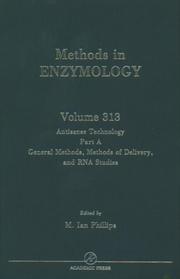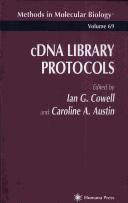| Listing 1 - 3 of 3 |
Sort by
|

ISSN: 00766879 ISBN: 0121822141 012182215X 9786611011000 1281011002 0080496717 9786611010997 1281010995 0080496709 9780121822156 9780121822149 Year: 2000 Volume: 313-314 Publisher: New York, NY ; London : Academic Press,
Abstract | Keywords | Export | Availability | Bookmark
 Loading...
Loading...Choose an application
- Reference Manager
- EndNote
- RefWorks (Direct export to RefWorks)
Antisense technology is the ability to manipulate gene expression within mammalian cells providing powerful experimental approaches for the study of gene function and gene regulation. For example, methods that inhibit gene expression permit studies which probe the normal function of a specific product within a cell. Such methodology can be used in many disciplines such as pharmacology, oncology, genetics, cell biology, developmental biology, molecular biology, biochemistry, and neurosciences. This volume will be a truly important tool in biomedical-oriented research.The critically acclaime
Acide nucleique [Ribo] --- Acide ribonucléique --- Acides nucléiques antisens --- Antisense nucleic acids --- Antisense nucleinezuren --- Oligonucleotiden --- Oligonucleotides --- Oligonucléotides --- RNA (Nucleic acid) --- Ribonucleic acid --- Ribonucleïnezuur --- Ribose nucleic acid --- Zuur [Nucleine] [Ribo] --- Antisense nucleic acids. --- Antisense DNA. --- Complementary DNA --- Antisense nucleotides --- Antisense RNA. --- Complementary RNA --- DNA --- Nucleic acids --- RNA --- Oligonucleotides, antisense --- Receptors --- Therapy
Book
ISBN: 1617790656 1617790648 9781617790645 Year: 2011 Publisher: Totowa, NJ : Humana Press : Imprint: Humana,
Abstract | Keywords | Export | Availability | Bookmark
 Loading...
Loading...Choose an application
- Reference Manager
- EndNote
- RefWorks (Direct export to RefWorks)
The numerous vital applications of complementary DNA (cDNA) technology have changed dramatically as the technology has advanced over recent years. In cDNA Libraries: Methods and Protocols, expert researchers provide current techniques that reflect the latest advances in the construction and application of cDNA libraries. The first half of the volume covers improved approaches to some of the most basic elements of creating cDNA libraries, while the second half casts a much wider net and includes visionary applications of cDNA technology which were either unforeseen or technically impractical until recently. Written in the highly successful Methods in Molecular Biology™ series format, chapters include introductions to their respective topics, lists of the necessary materials and reagents, step-by-step, readily reproducible laboratory protocols, and key tips on troubleshooting and avoiding known pitfalls. Authoritative and cutting-edge, cDNA Libraries: Methods and Protocols serves as an ideal guide to all scientists seeking to advance this important technology and provide answers to the enduring fundamental questions of biology.
Antisense DNA --- Publication Formats --- Genetic Structures --- Genetic Phenomena --- Publication Characteristics --- Phenomena and Processes --- Laboratory Manuals --- Gene Library --- Human Anatomy & Physiology --- Health & Biological Sciences --- Animal Biochemistry --- DNA, Complementary --- Antisense nucleic acids --- Acides nucléiques antisens --- DNA Library --- cDNA Library --- DNA Libraries --- Gene Libraries --- Libraries, DNA --- Libraries, Gene --- Libraries, cDNA --- Library, DNA --- Library, Gene --- Library, cDNA --- cDNA Libraries --- Genetic Concepts --- Genetic Phenomenon --- Genetic Process --- Genetic Processes --- Concept, Genetic --- Concepts, Genetic --- Genetic Concept --- Phenomena, Genetic --- Phenomenon, Genetic --- Process, Genetic --- Processes, Genetic --- Genetic Structure --- Structure, Genetic --- Structures, Genetic --- Complementary DNA --- DNA, Complementary. --- Human genetics. --- Gene expression. --- Human Genetics. --- Gene Expression. --- Genes --- Genetic regulation --- Genetics --- Heredity, Human --- Human biology --- Physical anthropology --- Expression

ISBN: 089603383X 9786610836765 1280836768 1592595553 Year: 1997 Volume: 69 Publisher: Totowa, NJ : Humana Press : Imprint: Humana,
Abstract | Keywords | Export | Availability | Bookmark
 Loading...
Loading...Choose an application
- Reference Manager
- EndNote
- RefWorks (Direct export to RefWorks)
The first libraries of complementary DNA (cDNA) clones were con structed in the mid-to-late 1970s using RNA-dependent DNA polymerase (reverse transcriptase) to convert poly A* mRNA into double-stranded cDNA suitable for insertion into prokaryotic vectors. Since then cDNA technology has become a fundamental tool for the molecular biologist and at the same time some very significant advances have occurred in the methods for con structing and screening cDNA libraries. It is not the aim of cDNA Library Protocols to give a comprehensive review of all cDNA library-based methodologies; instead we present a series of up-to-date protocols that together should give a good grounding of proce dures associated with the construction and use of cDNA libraries. In deciding what to include, we endeavored to combine up-to-date versions of some of the most widely used protocols with some very usefiil newer techniques. cDNA Library Protocols should therefore be especially useful to the investigator who is new to the use of cDNA libraries, but should also be of value to the more experienced worker. Chapters 1—5 concentrate on cDNA library construction and manipula tion, Chapters 6 and 7 describe means of cloning difficult-to-obtain ends of cDNAs, Chapters 8-18 give various approaches to the screening of cDNA libraries, and the remaining chapters present methods of analysis of cDNA clones including details of how to analyze cDNA sequence data and how to make use of the wealth of cDNA data emerging from the human genome project.
DNA, Complementary --- Gene Library --- Genetic Techniques --- Antisense DNA --- DNA --- Gene libraries --- Molecular cloning --- ADN --- Clonage moléculaire --- Laboratory manuals --- Manuels de laboratoire --- 57.088 --- 577.212.3 --- -DNA --- -Gene libraries --- -Molecular cloning --- -#ABIB:aimm --- Cloning, Molecular --- DNA cloning --- Gene cloning --- Cloning --- Genetic engineering --- Molecular genetics --- Clone cells --- Gene banks (Genetic engineering) --- Genomic banks --- Genomic libraries --- Biological resource centers --- Genomes --- Recombinant DNA --- Deoxyribonucleic acid --- Desoxyribonucleic acid --- Thymonucleic acid --- TNA (Nucleic acid) --- Deoxyribose --- Nucleic acids --- Genes --- Complementary DNA --- Antisense nucleic acids --- Special methods and techniques for studing biological molecules. Separation. Centrifuging. X-ray study. Radioisotope methods --- Nucleic acid base and sequence compositon. Experimental deciphering of genetic code. --- Antisense DNA -- Laboratory manuals. --- DNA -- Laboratory manuals. --- Electronic books. -- local. --- Gene libraries -- Laboratory manuals. --- Molecular cloning -- Laboratory manuals. --- DNA, Single-Stranded --- DNA Probes --- Genetic Structures --- Investigative Techniques --- Nucleic Acid Probes --- Analytical, Diagnostic and Therapeutic Techniques and Equipment --- Genetic Phenomena --- Nucleic Acids --- Phenomena and Processes --- Molecular Probes --- Laboratory Chemicals --- Nucleic Acids, Nucleotides, and Nucleosides --- Chemicals and Drugs --- Specialty Uses of Chemicals --- Chemical Actions and Uses --- Genetics --- Biology --- Health & Biological Sciences --- DNA, Complementary. --- Gene Library. --- Genetic Techniques. --- Laboratory manuals. --- 577.212.3 Nucleic acid base and sequence compositon. Experimental deciphering of genetic code. --- 57.088 Special methods and techniques for studing biological molecules. Separation. Centrifuging. X-ray study. Radioisotope methods --- Antisense dna --- Dna --- Dna, complementary. --- Gene library. --- Genetic techniques. --- Clonage moléculaire --- #ABIB:aimm --- Nucleic acid base and sequence compositon. Experimental deciphering of genetic code --- Cytology. --- Immunology. --- Cell Biology. --- Immunobiology --- Life sciences --- Serology --- Cell biology --- Cellular biology --- Cells --- Cytologists
| Listing 1 - 3 of 3 |
Sort by
|

 Search
Search Feedback
Feedback About
About Help
Help News
News